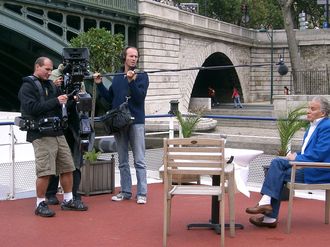What is the role of the "boom guy" in film production?: originally appeared on Quora: The best answer to any question. Ask a question, get a great answer. Learn from experts and access insider knowledge. You can follow Quora on Twitter, Facebook, and Google+.
Answer by Scott Danzig, I've been making short films for the past couple of years, and some music videos before that. Read a bunch of filmmaking books, wrote a few screenplays, and did editing in Final Cut Studio.

Image by PRA
A boom operator works in concert with the sound recordist to position the microphone that records the production audio.
They should be, first and foremost, very knowledgeable about how different types of microphones work. Different types of microphones have different pickup patterns:
I'll discuss the most common varieties I see.
Cardioid and hypercardioid microphones are best suited for indoor recording. They have shorter reach (so they don't record sound reflected off walls) and are sensitive to ambient noise.
Cardioid microphones (usually the round-headed microphones) are more omnidirectional than hypercardioid, which you can tell from the "pickup patterns". If you want to record sound at a poker table, where you're picking up everyone from all directions, you'd want a cardioid mic. If you want to avoid some of the ambient noise and focus on one or two particular actors, you'll want the more directional hypercardioid mic.
A shotgun microphone's pickup pattern is more elongated.
It's better for outdoors, because it won't pick up ambient noise, such as passing cars, or mangy crows. Also, the extra reach is good, because you can pick up sound from farther away more easily. Indoors, a shotgun mic is going to have problems, because it will record sound bouncing off walls very well, and you'll have audio with undesirable echo.
Usually, a boom operator usually needs to figure out how to position a mic so there is minimal opportunity for undesirable noise.
Usually this means holding the mic directly above and in front of the actor's mouth, pointing downward, only picking up the air vibration caused by the actor's dialogue. Sometimes, especially with a low ceiling, the microphone needs to be positioned low, pointing at the ceiling.
The point is, a boom operator has to know that. Also, they have to be knowledgeable about the needs of the camera department. They need to be able to position a microphone so that it's out of the frame of the camera, given the lens being used, and not causing a shadow that shows up in the video. It's true the cameraman can tell the boom op when something is wrong, but they have to think for themselves as well.
Just like the cameraman, they have to familiarize themselves with the action in each shot, and be prepared to adjust the microphone to each actor as they begin to speak, perhaps moving across the frame.
They need to lead the target so the microphone always stays in front, where the dialogue is being spoken. They wear headphones which let them hear exactly how well they're picking up the audio they're recording, adjusting when necessary.
A boom operator of course requires strength and endurance too. No matter how long each shot is, they have to stay still, often in an unbalanced, stressful position, and be absolutely still and quiet. They can't let the microphone drop into frame. It might ruin a shot... and also could knock an unsuspecting actor unconscious.
I made the mistake once of underestimating the prerequisites of the position for my last film shoot. No "sound guy" wanted to work with the friend who I thought could handle the job. They all preferred to handle the boom themselves, which is what I ended up going with, and it worked out well enough. For smaller film shoots only requiring one boomed mic, having a dedicated boom operator is optional. However, whoever handles the responsibilities has to know what they're doing.
For my other answers about filmmaking, check out my Quora blog, Director's Notes.

